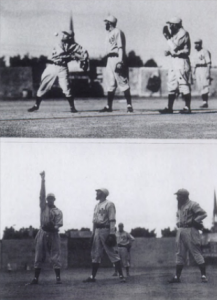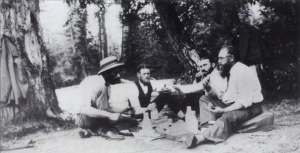“The Famous Pepper Game!”
This post is part of a series of blogs completed for EAMC 606: Cities on a Hill: Material Culture in America’s Communal Utopias. This class examined the history and material culture of intentional communities throughout American history using Winterthur’s collections as well as field studies.
Sitting under mylar in Special Collections at Hamilton College’s Burke Library is a 1934 House of David baseball game advertisement that proudly states, “See the Famous ‘Pepper Game!’ — Worth the Price of Admission Alone!” The “Pepper Game” was invented by the House of David baseball teams which were twentieth century barnstorming teams comprised of long haired, bearded players from the House of David and City of David religious colonies in Benton Harbor, Michigan. Of the dozens of ephemeral objects Special Collections pulled on a recent field study for the class Cities on a Hill: Material Culture in America’s Communal Utopias, the baseball advertisement helped contextualize the role baseball played in maintaining the communal identity of the House of David. To my surprise, the advertisement did so by bringing back memories of the communal environment created by the “pepper”-esque games I grew up playing.

Image 1: House of David baseball game advertisement. Image courtesy of Communal Societies Collection at the Hamilton College Library Special Collections.

Image 2: Photograph of three “Famous ‘Pepper’ Players”—George Anderson, Doc Tally, and John Tucker. When this photo was taken, the men played on the House of David team from the City of David religious colony. This is the original photograph used to promote the players in the bottom left corner of the 1934 advertisement. Image courtesy of Communal Societies Collection at the Hamilton College Library Special Collections.
Growing up on arid summer days in Wyoming, I would run over to my best friend’s house next door to hang out with him and his older brother. Either I would have already raided my parents’ food pantry or they, their parents’, and then with our gloves in hand we would run off to the baseball field a short distance away. With never enough people to play an actual baseball game, we would resort to playing “pepper” until the sun went down. Our version of the pepper game included a single baseball, an aluminum bat, and at least three people—one person to hit the ball and two to compete over who could field the ball the cleanest. Similarly, House of David pepper player George Anderson stated in a 1991 interview that they would, “Hit the ball, pick it, throw it back. They’d hit it back to ya.’” Unlike the House of David team, our games would be interspersed with breaks to share the snacks from our parents’ pantries.

Image 3: House of David baseball players playing the “Pepper Game” in the middle of the fifth inning. Image courtesy of “The House of David Baseball Team” by Joel Hawkins and Terry Bertolino.

Image 4: House of David baseball players playing the “Pepper Game” in the middle of the fifth inning. Image courtesy of “The House of David Baseball Team” by Joel Hawkins and Terry Bertolino.
As we joined organized baseball, the more communal game of “two-ball” replaced pepper as a pre-game ritual. A sort of juggling competition that more closely resembled the House of David pepper tricks, “two-ball” players would toss two baseballs between each other in crafty and acrobatic ways in hopes that someone would not be able to catch them. In his 1991 interview, Anderson noted, “Usually three of us lined up when they did that. So we got to juggling the ball around. And passing it back and forth.” Whether it be working together, competing against each other, or sharing snacks and pre-game rituals, a strong sense of unity and community was created through these House of David-influenced games.

Image 5: When traveling to baseball games, the House of David players would use the seats from their vehicles to eat lunch together on the ground. Image courtesy of “The House of David Baseball Team” by Joel Hawkins and Terry Bertolino.
My memories of “pepper” as a communal activity was simply a means for beginning to think about baseball’s role in maintaining the communal identity in an intentional community. To the House of David baseball players, pepper may have been nothing more than a crowd-pleasing activity. However, thinking about the House of David’s relationship with baseball did call my attention to the ways in which the game could have helped maintain the team’s communal identity while they were playing hundreds of games away from the colony. The players’ unshaven beards, long hair, and matching uniforms not only unified the players physically, but the popularity of their common appearance to the larger society undoubtedly had reaffirming benefits that reached beyond the religious purpose of their look. The baseball team’s act of traveling as a group was in and of itself communal. They players would spend weeks, or even months, traveling thousands of miles in buses where they would eat and room communally. According to authors Joel Hawkins and Terry Bertolino in The House of David Baseball Team, when stopping to eat on the road, the team would take the seats out of their vehicles and sit together to talk about their strategy for their upcoming game [1]. Using the game of baseball as a medium, the House of David and City of David religious colonies established successful traveling intentional communities in the twentieth century.
[1] Hawkins, Joel and Terry Bertolino. The House of David Baseball Team. Chicago: Arcadia Publishing, 2000.
By RJ Lara, WPAMC Class of 2019

Jolly good show!!!!